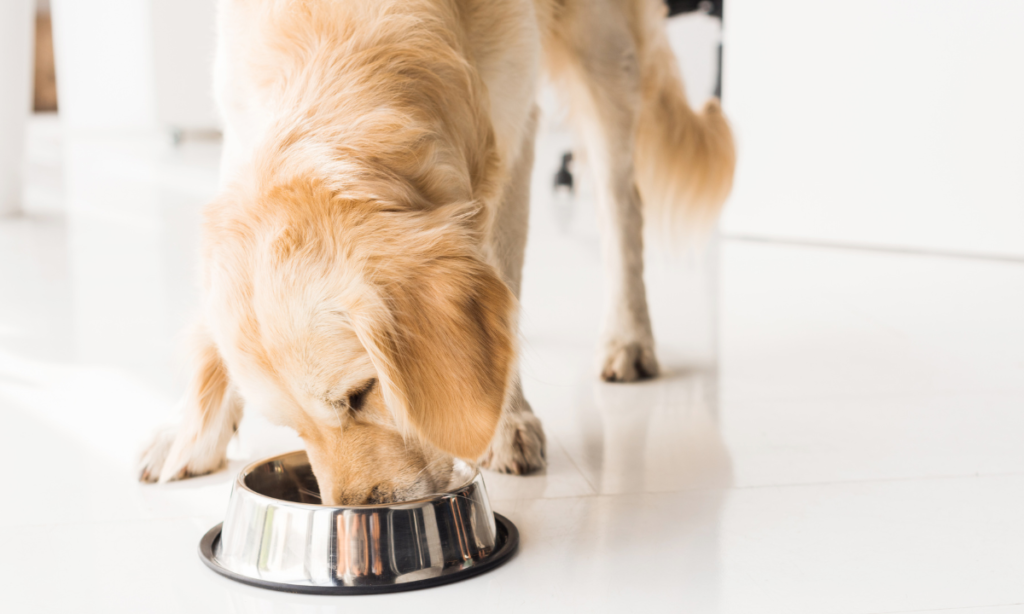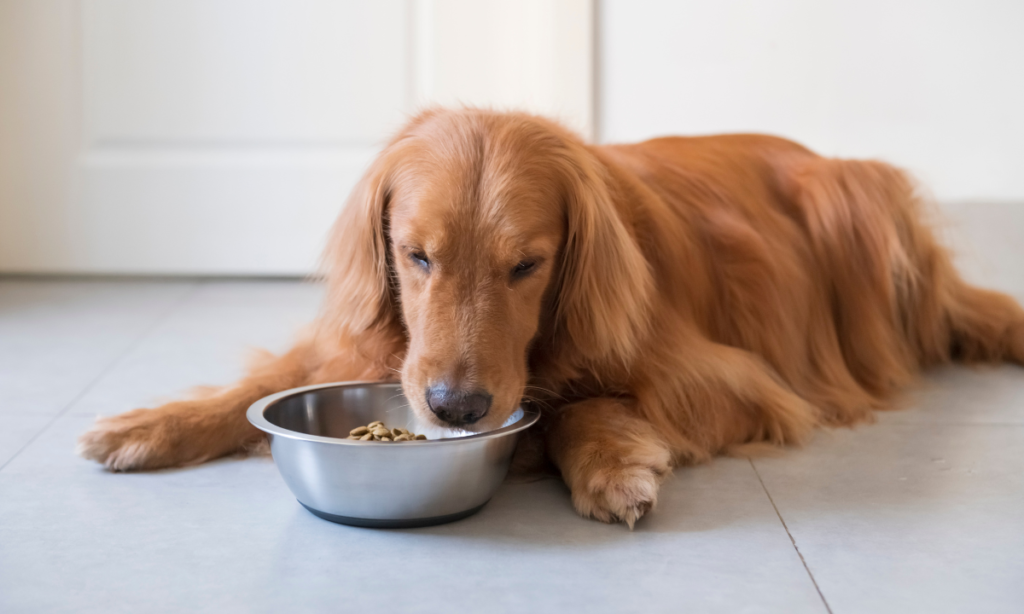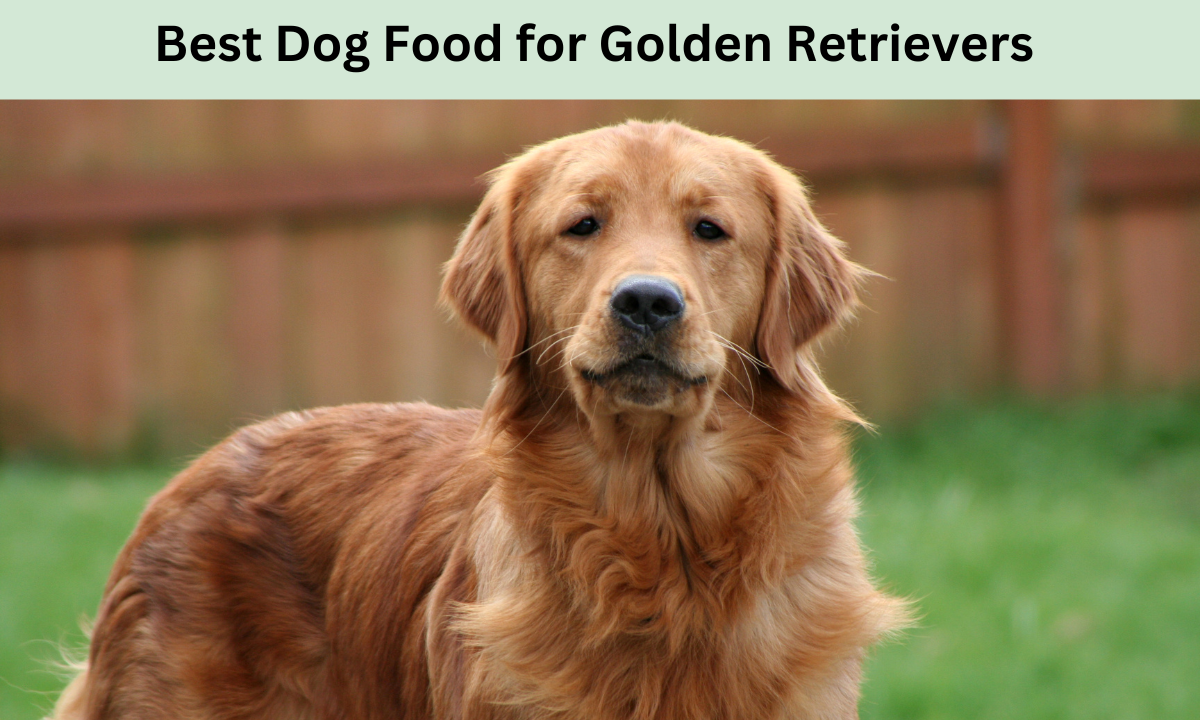Golden Retrievers are one of the most popular breeds of dogs across the world. They are loving, affectionate, and playful in nature. As owners, we are responsible for ensuring our furry companions lead healthy and happy lives by providing them with the best possible nutrition. In this blog, we will explore various types of dog foods available in the market and determine the best dog food for golden retrievers, considering their nutritional needs and dietary requirements.
How to Choose Best Dog Food for golden retrievers

The first step is to choose the best dog food for the golden retriever puppy, ideally made by a reputable brand. Golden retrievers have coats that need the right oils and nutrients to stay shiny and healthy.
Their joints also need support as they are at risk of developing arthritis. Go for the best dog food for golden retrievers that is rich in protein from meat sources, supplemented with vitamins, minerals, and other nutrients required by adult dogs.
These contribute to their overall growth, energy levels, and coat condition. Instead of very low-priced foods or homemade mixes, always select premium dog foods that suit the needs of your golden buddy.
Best dog food for golden retriever puppies: Dry vs Wet Food
Most dog owners give dry kibble to their pets on a regular basis as it is easy to store and feed. However, golden retrievers also benefit from wet or canned food included in their diet. While dry foods help remove plaque and tartar from teeth, canned foods contain higher moisture levels that keep dogs hydrated.
They also tend to have meat or fish as the main ingredient, unlike carbs and fillers in some dry foods. Try mixing both varieties in the right proportions suited to your dog’s needs, like three parts dry to one part wet food. This balanced mix provides the advantages of both textures in a single diet.
Best dog food for a golden retriever: Grain-Free or Limited Ingredient Diets

Many experts now suggest grain-free diets for dogs prone to food sensitivities. This is because some dogs, including golden retrievers, do not properly digest certain grains like corn, wheat, and soy. A dedicated grain-free diet removes potential allergens from their diet.
Limited-ingredient diets containing a single source of protein and easily digestible carbs also work well for dogs with sensitive stomachs. Such specialized diets effectively manage conditions like digestion issues, skin allergies, and ear infections for goldens in the long run. Check with your vet before switching to ensure it suits your pet’s requirements.
Omega Fatty Acids for Skin and Coat
Golden retrievers have lustrous coats that need external oils for glowing health. Dog foods rich in omega-3 and omega-6 fatty acids from fish, flaxseed, or other plants moisturize skin and coat from within. These ‘good fats’ reduce itching and flaking while keeping fur soft and shiny.
Some premium dry foods and most canned foods contain healthy doses of these essential fatty acids beneficial for retrievers. Ensure fat content is moderate at around 15-20% of total calories to avoid obesity in your playful golden friend.
Home-Cooked vs. Packaged Foods
While home-cooked meals can be customized, balanced packaged dog foods have undergone extensive research and meet the complete nutritional needs of canines. It is difficult for average owners to formulate homemade diets matching the macros, micros, vitamins, and minerals in ratios required for dogs’ bodily functions.
Unless under vet guidance, refrain from DIY meals that may lack or have excessive nutrients, causing health issues over the long term. Stick to high-quality commercial foods from trusted brands to ensure golden retrievers grow strong and stay healthy daily.
Senior Dog Foods
As golden retrievers age, their nutritional needs gradually change. Senior dogs above seven years require foods customized for their stage of life. Look for old dog foods enhanced with glucosamine and chondroitin to protect aging joints from inflammation and stiffness. Reduced calories also help senior goldens maintain a healthy weight.
Opt for easily digestible protein sources and grains in senior recipes. Consistency and fiber levels hold importance, too. Consult your vet on the best senior food suited for your older golden age, as individual needs may vary.
Feeding Guidelines
- For puppies, follow these steps to feed the best dog food for golden retrievers:
- Divide daily food portions into 3-4 meals until three months of age.
- Gradually reduce meals to 2 times a day from 3-6 months.
- For adult golden retrievers:
- Feed 1-2 cups of dry kibble into morning and evening meals.
- Adjust amounts as your vet advises based on your dog’s size, age, and activity levels.
- Always keep fresh, clean water available for your dog.
- Follow a set feeding schedule and do not allow uncontrolled snacking between meals.
- Consult your vet regarding any changes needed for senior golden retrievers above seven years of age.
- According to the vet, adjust amounts and consistency for individual dogs.
- Maintaining a regular feeding routine is important for goldens’ health and fitness.
Supplements for Joint Health
As large and active breeds, golden retrievers are prone to joint issues like hip dysplasia if not properly nourished. Many premium dog foods now include glucosamine, chondroitin, and other ingredients that support healthy joints.
However, supplemental joint support may be needed for aging or high-activity dogs. Look for fish oil, MSM, or hyaluronic acid supplements recommended by your vet. Give as directed and consult advice before giving additional supplements and commercial dog food. Joint supplements can reduce inflammation and maintain mobility for golden retrievers throughout their energetic lifetime.
Dental Care and Food
As with humans, dental health is important for dogs. Hard kibble acts like a toothbrush to scrape away plaque and tartar buildup. However, some soft, chewy treats and dental bones can also be included occasionally. Give access to plenty of toys for healthy gum stimulation through play.
Foods with meat or fish as the first ingredient also support oral care by producing less stain and calculus than carbohydrate-based foods. Routine dental checks by your vet and professional cleanings as needed keep gums and teeth healthy in cheerful golden dogs.
Conclusion
The best dog foods for golden retrievers are high protein, limited ingredients dry foods supplemented with canned foods for hydration and balanced nutrition. Look for options rich in omega fatty acids and avoid common allergens and fillers unsuitable for their diet.
Instead of untested homemade mixes, always choose premium packaged options from reputed brands that meet your furry friend’s complete dietary needs for a long and active lifetime together. With the right balanced nutrition from puppyhood, your loving golden will showcase a radiant coat and plenty of playful energy for years to come.
Frequently Asked Questions (FAQs)
Is grain-free better for goldens?
While some goldens do well on grain-free foods, there is no conclusive evidence that grain-free provides health benefits to all dogs. Some goldens may have grain sensitivities, but others thrive with whole grains like brown rice or oats included. Work with your vet to determine the best option for your golden’s needs.
How do I transition my dog to a new food?
When switching foods, gradually over 5-7 days by mixing increasing amounts of the new food with the old. This prevents issues like diarrhea. Start with 25% new mixed with 75% old and grow the unknown proportion each feeding until the switch is complete. Go slowly and introduce changes carefully to avoid upset tummies.
What food is best for puppies?
ook for large-breed puppy formulas that promote healthy growth without putting pressure on developing joints. Limit protein and calories to reduce risks of bone and joint issues. Feed 3-4 times daily until six months, when you can switch to an adult food and feeding schedule. Always consult your vet for the best diet suited to your golden puppy.
Also read:


